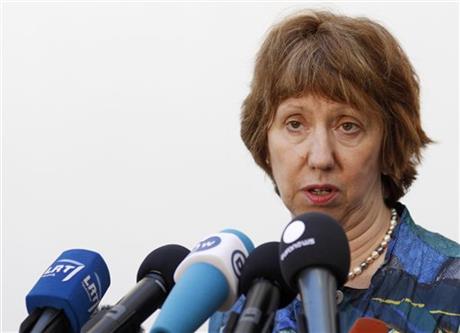
By JUERGEN BAETZ and RAF CASERT
European foreign policy chief Catherine Ashton talks with journalists as she arrives for a Informal Meeting of EU Ministers for Foreign Affairs at the National Museum – Palace of the Grand Dukes of Lithuania in Vilnius, Lithuania, Friday, Sept. 6, 2013. (AP Photo/Mindaugas Kulbis)
BRUSSELS (AP) — The European Union and the U.S. are moving closer to resuming international talks with Iran on its disputed nuclear program, buoyed by recent changes in Tehran’s leadership, officials said Friday.
“We are ready to come very quickly to talks,” said EU foreign policy chief Catherine Ashton, who has over the past years led the negotiations with Iran over allegations it is seeking to build a nuclear weapons program. “We really want to move now quickly to resolve this.”
Recognizing the election of centrist Hasan Rouhani as president in June, President Barack Obama said that it offers “the opportunity to demonstrate in acts and not just words that … they do not pursue nuclear weapons.”
French President Francois Hollande, who was in St. Petersburg with Obama for the Group of 20 summit, said that “we want to believe in the statements of the new president” who has sounded more conciliatory than his predecessor.
Rouhani confirmed Thursday that the foreign ministry led by Javad Zarif — a Western-educated diplomat — will lead nuclear talks with world powers, marking a shift away from the often more hawkish security officials who had previously set the negotiation strategy.
At a meeting of the EU’s 28 foreign ministers in Vilnius, Ashton said she called Zarif and agreed to meet with him later this month on the sidelines of the U.N. General Assembly in New York.
“I stand ready with my colleagues to get the talks moving,” she said. Ashton added she hopes “that when we meet in New York we will have the opportunity to set dates (for the formal talks) there.”
“We’ve got some good proposals on the table. We are always willing to listen to good proposals from Iran,” Ashton said.
While it is assumed that Iranian Supreme Leader Ayatollah Ali Khamenei will have the last word on the nuclear issue, Rouhani was elected on the promise of getting rid of the international sanctions that are crippling Iran’s economy. Analysts view the appointment of the foreign affairs ministry to lead the nuclear negotiations — instead of the Supreme National Security Council — as a sign that the new administration might be more willing to compromise with the West.
On Friday, a report by the semi-official Mehr news agency in Iran pointed in the same direction. It quoted Zarif as saying “We see our interest in removing the misunderstanding, if there is any.”
Swedish Foreign Minister Carl Bildt said in Vilnius that he sees a broader shift in approach as other leading Iranian officials had also been named to new posts linked to the nuclear issue. “They all point in the same direction,” Bildt said. “That they are more interested in a dialogue.”
At the same time, a top EU court on Friday said it would throw out penalties imposed on several Iranian businesses for their alleged ties to Iran’s nuclear program.
The EU General Court ruled there wasn’t sufficient evidence to justify the sanctions imposed by the bloc on eight Iranian banks and companies.
The court said the sanctions will stay in place for at least two months pending any appeal. If an appeal is filed by an EU government, the sanctions would remain binding until a ruling.
Friday’s ruling affects private and semi-governmental banks with mostly domestic activities, an insurance company covering Iranian international trade, and engineering companies known for their oil business, the main source of Iran’s foreign revenue.
“We are fully aware, as are the (EU) member states, of the consequences deriving from these judgments,” said Michael Mann, spokesman for EU foreign policy chief Catherine Ashton.
He said Ashton’s office “and the EU’s member states are also fully aware of the need to come to a swift conclusion on the approach regarding these cases.”
The EU is one of Iran’s most important trading partners. Since 2010, however, the bloc has imposed asset freezes and travel bans on top of existing U.N. sanctions, targeting Iranian citizens and companies believed to be linked to the country’s nuclear program. The EU then significantly escalated the nuclear-related sanctions by 2012 to include an oil-import embargo.
Despite the West’s claims, Tehran insists its nuclear program serves only civilian purposes, such as energy production and medical research. Years of negotiations with Iran with the five permanent U.N. Security Council members plus Germany have failed to make much headway.
Friday’s EU court ruling voided the freezing of assets held in the EU by Post Bank Iran, Iran Insurance Company, Good Luck Shipping and Export Development Bank of Iran. It found that the bloc’s governments couldn’t “properly establish that they had provided support for nuclear proliferation.”
The court also annulled the sanctions imposed on Bank Refah Kargaran, Persia International Bank, a businessman identified only as Mr. Bateni, and Iranian Offshore Engineering & Construction Co., citing insufficient evidence.
However, the court dismissed a similar lawsuit brought forward by the country’s important Bank Melli Iran because the institute continued to pay scholarships for the Atomic Energy Organization of Iran after the latter was put on a U.N. Security Council sanctions list.
The court also upheld sanctions against the Germany-based EIHB, or European-Iranian trade bank, leaving its funds frozen.
___
Juergen Baetz reported from Brussels. Angela Charlton contributed to this report from St. Petersburg.
___


